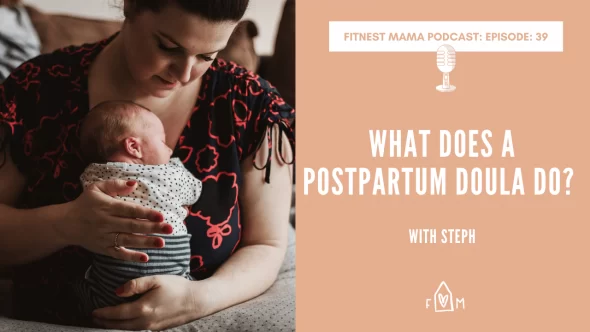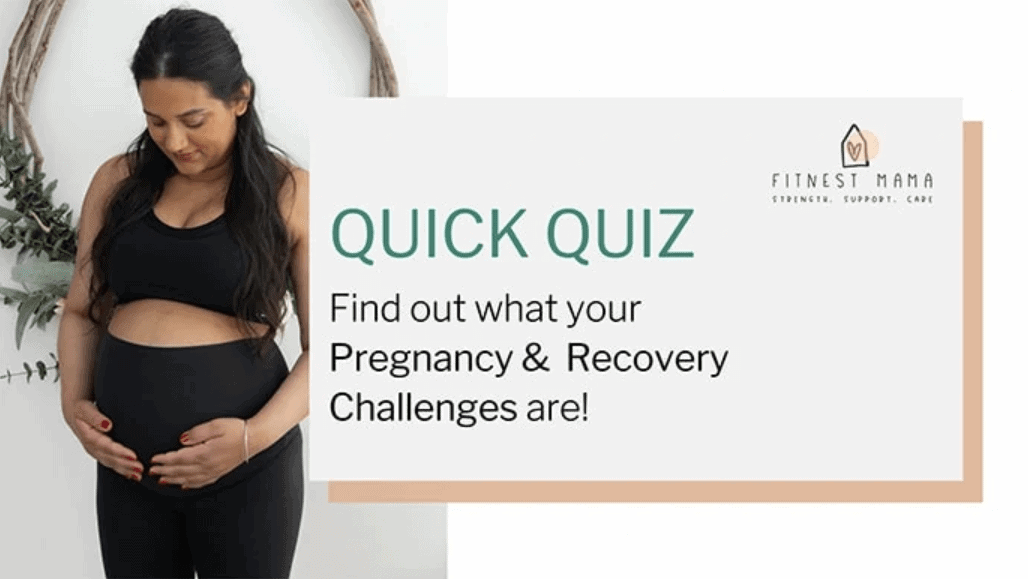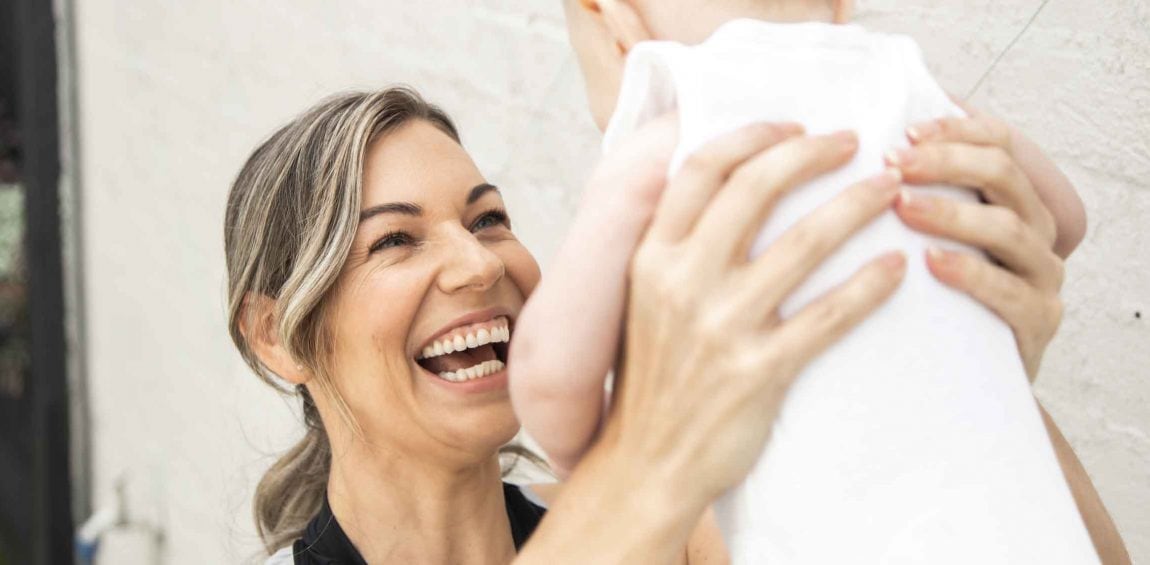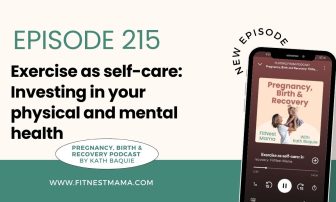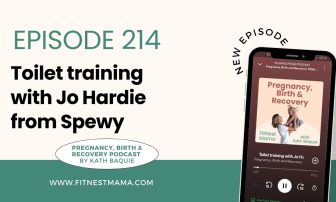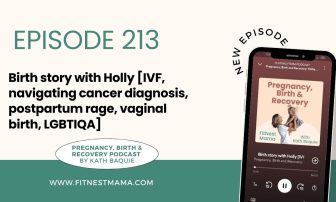In Steph’s role as a postpartum doula, she works with women during pregnancy to plan for their ideal postpartum. This includes tackling any fears or worries, setting up support networks and village building and getting clear on personal boundaries and learning how to boost oxytocin which is the love hormone in postpartum. Steph loves babies, but describes her approach as 100% mother focused because as we all know, we can’t pour from an empty cup.
In this episode, Steph and I chat about her top three tips for a peaceful postpartum experience. And I really do think it is one that all pregnant and new moms need to hear. But before we do dive into this episode, I want to let you know about the free 7 Day Trial that’s available for FitNest Mama. In these seven days, you are able to try one of our twice-weekly live-streamed Pilates classes. Do as many on-demand classes as you’d like. Binge listen to guest expert speakers discussing topics including hypnobirthing, induction, calm birthing, mindset, and more. And there are also heaps of Q & A sessions with myself on all sorts of topics such as abdominal muscle separation, pregnancy-related pelvic pain, cesarean scar massage, mastitis, and more. All you need to do is head to https://www.fitnestmama.com/free.
Alright, let’s get into the show.
KATH BAQUIE
Well, thank you, Steph, for joining me today. It’s lovely to chat.
STEPH O’BRIEN
Thank you for having me. I’m very excited.
KATH BAQUIE
We’ve been talking so much on Instagram. So it’s good to finally see you face to face.
STEPH O’BRIEN
I think it was back when you’re first starting the podcast. So finally.
KATH BAQUIE
Absolutely. So for those who don’t know you, could you introduce yourself and let us know what you do.
STEPH O’BRIEN
Yeah, sure. So I’m Steph. I’m a postpartum doula in Melbourne. I live in the western suburbs. I’ve got a little boy who is nearly three, a husband, and yeah, I don’t know. It’s really hard to describe yourself sometimes.
KATH BAQUIE
It’s a bit like that. So what is a postpartum doula?
STEPH O’BRIEN
A postpartum doula is someone that’s going to work with you in pregnancy to help you kind of achieve the postpartum that you want. And someone that will be there after the baby is born to help you navigate that early motherhood period. Because it’s such a challenging and fragile time. And you know, it’s also a really beautiful time. But we often don’t have the support that we need or the village that we need to help us feel like we’re coping. So a postpartum doula is someone that’s going to come in and basically be your post-birth wing woman, someone that’s there just for you. Not focused on the baby. They’re focused on you and your emotional well-being and your physical health and so many things, making sure that you’re resting and getting enough sleep and eating the right food. And, yeah, just someone to sort of be a sounding board with.
KATH BAQUIE
Sounds amazing. So just to be clear, there are doulas for childbirth. Is that correct?
STEPH O’BRIEN
Yup.
KATH BAQUIE
And then you specialize more in just the postpartum phase.
STEPH O’BRIEN
Yeah, so there’s some doulas that will do both birth and postpartum and some that are just birth specifically, and then some that are postpartum specific. So for me, I’m just postpartum. But I do have conversations with my clients around birth around how they want to birth and just to make sure that we try and do whatever we can to make sure they get the birth that they’re after, but I’m not physically there during birth.
KATH BAQUIE
So how do you vary from the support that someone might get? I guess that’s the problem, isn’t it? Once you have your baby, generally, there’s a couple of visits from the maternal child health nurse into your home, maybe one or two, I can’t remember. And then it’s checkups every few weeks at the maternal child health center, like how’s your role different from other supports that a new mom might have?
STEPH O’BRIEN
I think with the maternal and child health appointments, they are really focused on the baby, they’re there to weigh the baby, and to make sure they’re reaching milestones, which is really important, but a postpartum doula is not there to look at things from a medical perspective, they’re really there to make sure that mom is coping with all of the changes that are happening. And they might be coming in and doing like a birth debrief. So someone is there to listen to your experience without passing judgment or opinions. And I think sometimes with maternal and child health appointments, it’s a quick appointment, it’s 15 minutes, you’re in and out, you don’t really get to talk to anyone if you are feeling like you’re struggling or not coping whereas a postpartum doula is going to come into your home and probably be there for a minimum of three hours every visit, and make sure that you’re getting exactly what you need. And there’s someone that you trust as well. So someone that you’re more likely to share with what’s really going on below the surface.
KATH BAQUIE
Yeah. So it sounds like and correct me if I’m wrong. So you’re not there for the medical side of things. You don’t have the medical training, but you’re there like, as you said, as a wing woman, or that best friend or that mother, that support network for those early days and weeks.
STEPH O’BRIEN
Yeah, and that can look like a lot of different things to every individual woman depending on what she needs. So it can be really daunting asking for help. When you’re a new mother, I think we have this fear of being a burden or a fear of being rejected. With a postpartum doula. They’re there for you. So there’s someone you can call up and say, “Hey, I’m exhausted. Can you come over? I just need to sleep.” And while they’re sleeping, you can do their washing, cook their dinner, clean their kitchen, make sure babie’s okay. And then the next visit might be that they just want to get outside and get some sunshine on their face. So they might go for a walk while you have the baby at home. Or there’s honestly so many variations of what a postpartum doula does. We wear a lot of hats.
KATH BAQUIE
Can you talk more like I was just getting right into what you were saying? Give me a week in the life of a postpartum doula.
STEPH O’BRIEN
Oh, gosh. So it really depends. For me personally, I like to work with my clients while they’re pregnant, to really work out what it is that they’re after that they need from me. And so for most of them, it’s that they don’t have, they might not have a lot of family nearby, or people that they really feel like they can rely on or speak honestly with, they might have had a really negative first postpartum experience. So this time, they want to have the support in place to make sure that they are looked after.
For example, if it’s a first visit with a man that’s just had her baby, I would come in and just sit with her, maybe have a coffee and a tea, I’ll bring the snacks and you know all of the yummy things. And we’ll just see where she’s at and how she’s feeling about her birth experience. And there might be things coming up from her birth experience that are impacting her in postpartum now, like maybe some birth trauma, or, you know, she might just want some tips on breastfeeding to make sure that everything’s looking Okay, and baby’s feeding well, and just some reassurance, it’s really varied.
KATH BAQUIE
It sounds so brilliant. So a few episodes I go, I’ll have to quickly look up which episode it was. But I spoke to the lovely Helen Nightingale, who’s a midwife, and she’s created and unpacking after baby service, because she found there was a big need for women to debrief after having a baby and unpack not just the birth story, but like some women have an amazing birth, but their pregnancy was really challenging or trying to conceive, or that newborn after birth period, so to be able to debrief with you, or just talk and you know, talk uninterrupted about your experience, whatever that might be. I personally think that would be so beneficial, and so healing for so many women.
STEPH O’BRIEN
Yeah. And I think for a lot of women, just talking about it once isn’t enough, you know, as the weeks and months go on different layers sort of start to peel back from that experience. And it’s really good to have someone there that you trust that you can talk with. I know, in my own experience, I was so desperate for someone to ask me how my birth went, and no one did. Or if they did it was that you know, they would say, “Oh, well, that’s nothing.” This is what happened to me. And you know, you don’t really feel validated in that, but we know that a lot of women are struggling and postpartum with postnatal anxiety and depression and a lot of that stems from birth trauma. So it’s really important that you’ve got someone that you trust that you can unpack this stuff with, and someone that can refer you on if you do need more specialized help from a psychologist or a counsellor or something like that.
KATH BAQUIE
That’s great. So can we unpack that a little bit more your postpartum experience? Because I believe that was a big driver behind becoming a postpartum doula.
STEPH O’BRIEN
Yeah, absolutely. So I wasn’t a postpartum doula. Before I had my son. I was working in a corporate communications background. I had my son. And I just remember, it was probably week two or three thinking to myself, this is so bloody hard. Why did no one tell me this? And obviously, people don’t necessarily want to scare you, or tell you the horror stories. But I felt like I just wasn’t prepared for I guess, the emotional shift and the sleep deprivation. And I just would have loved to have had someone that I could text at 2:00 am and be like, “Hey, help me.” And there’s also so much information you get in postpartum. So whether it’s the maternal and child health nurse, your GP, your obstetrician, whoever it might be, there’s all of this information. And a lot of it is conflicting and confusing. So it’s great to have, you know, I wish I had someone that was just the one person I went to for things.
And then, I guess later on in postpartum, I really felt lonely, like, really lonely after my husband was back at work, and people sort of stopped visiting. You know, it’s just you and the baby. And it’s like, I don’t really know what to do with myself right now. And so overcoming that loneliness. And, you know, I really wish I had learnt that I didn’t have to be doing it all, to be a good mom. And that it was okay to say, I’m feeling lonely right now. And I need to find some community. But in saying that, too, I feel like I had a very supportive family and very supportive friends in early postpartum. And that only makes me think, Well, how do people cope when they don’t have anyone. And that’s when I knew, I just felt so cold to this work, I knew that I wanted to work with women in postpartum and hopefully helped make a bit of a difference to their experience, because I think we get postpartum wrong a lot of the time as well. You know, having your partner’s only home for two weeks, that kind of sends a message that you should be fine after two weeks on your own. And that’s ridiculous.
KATH BAQUIE
Yeah, absolutely. I could talk for an hour about that from a physical point of view, absolutely. Two weeks postpartum, you might have to be at the supermarket pushing a trolley with a toddler and a hip.
STEPH O’BRIEN
And especially, I mean, for me, I ended up having an emergency cesarean. So that was, you know, a good six weeks of recovery, but then you really don’t recover from a C section. You know, you need to give yourself a good 12 months to fully recover from things. And I’m sure in the work that you do, you know, you’re providing that physical support to women. I didn’t know that existed, which is really sad.
KATH BAQUIE
Well, that’s right, even we’re chatting on your podcast soon. So everyone will have to check out your podcast, which is called Postpartum Stories with Steph and I will be chatting about my postpartum experience and how that was a big driver behind creating FitNest Mama. So yeah, absolutely, right there. I think it’s improving postpartum support. But it’s got a long way to go.
STEPH O’BRIEN
Oh, absolutely. Absolutely. Like, I think, you know, you get given all these handouts in the hospital. 3 pieces of paper after you’ve had your baby like, here’s some people you can call but it’s not really like, specialized or specific. Like there’s no, there’s no postpartum doula handout, and they probably should have.
KATH BAQUIE
Oh, that’s right. And like, I wish every single woman who had a baby would have a six week pelvic floor assessment, whether or not you had a vaginal or a caesarean birth. Because we know etc…. Because we know that incontinence is such a big issue, especially later in life. And we know that pregnancy and childbirth are one of the big risk factors yet, in Australia that isn’t their option. It’s improving around the world. Now, I do believe France, I might be wrong. But France and England now have a six week pelvic floor check, which is amazing. So hopefully one day if we keep talking about it, one day, it will happen here in Australia too.
Okay, so Steph. You’re all about creating a village in that postpartum experience in that postpartum period. Could you please take me through, let’s say, three tips to help create that postpartum village to help support you and to help you along the way.
STEPH O’BRIEN
Sure. So I think we’ve probably all heard the phrase, it takes a village to raise a child. But we don’t have a village so much in Western culture anymore. 10s of 1000s of years ago, we traveled with our families. And we were, you know, hunting and gathering. And if a woman had a baby, there were six other adults that could help hold the baby while she rested, or feed the mom, and make sure that she was looked after, we don’t have that anymore. But there are some things you can do to try and help create your village. So my first sort of tip is to just make a list of your friends and family that you can really count on. And by this, I mean anyone that you would feel comfortable crying in front of being naked in front of and farting in front of because that is early postpartum, you know, you are a little bit of a mess, and you don’t want to have Auntie Karen sitting on the couch, waiting for her cup of tea and judging you for not brushing your hair. So only having those people in your space that you really trust and that you know, would want to help you in early postpartum. So friends that will bring a meal, friends that will go and make their own cup of tea, or will go and put a load of washing on. So really not that out. And don’t include anyone just because of they’re family or friends because not all helpers could help.
My second tip would be to outsource where possible in those first few weeks. So it might be, you know, food delivery services like HelloFresh, or you foods, just to take the pressure of having to cook and having to even think about food, getting a cleaner. And if that’s something that you, you can afford to do maybe once a month just for the first few months, again, taking that pressure off yourself to feel like you have to be doing all these things, when really you just should be resting and falling in love with your baby.
KATH BAQUIE
And you know, even delegating friends or family or your partner, whoever it is to do that heavy housework. So the vacuuming, that taking out of the heavy laundry can weigh kilos kilograms, it’s so heavy, with wet laundry. So make sure you delegate those tasks, because that will really help any pelvic floor and core recovery in those first six weeks.
STEPH O’BRIEN
Yeah, absolutely. And I’ve had clients that have made a little list of things, I’ve stuck it on their front door. And it’s you know, a friendly list that says, Hey, guys, here’s some things that you’re more than welcome to help out with, you know, and it’s worked really well like and the other thing I think is a great idea is to have people helping to train older children, you know, take them to the playground, take them out for a few hours, just so you’ve got someone on one time with your baby as well. And so that they’re feeling, you know, that connection with someone to
KATH BAQUIE
This was a godsend for me with my third baby, I should have gotten on tour with my second. But with my third, I knew that my husband worked long hours, and I called upon a babysitter to come and help me out between five o’clock and seven o’clock. I was so lucky, you know, to be able to have her and she was just a little teenager babysitter and she was brilliant. I loved it. She was like my doula.
STEPH O’BRIEN
Yeah, and that was sort of during that witching hour where you really needed an extra set of hands. So that was great.
KATH BAQUIE
She didn’t take over, she just helped me, you know, get the older kids dressed and helped. While I was breastfeeding, those sorts of things.
STEPH O’BRIEN
Perfect. And so the third thing I would recommend is looking at your digital community. You know, we’ve got social media, in our hands 24 seven, there are a variety of different Facebook groups for parents, some of them won’t be your people. And so it’s a good idea to have a think about, you know, the kind of people you want to connect with, because I think we’re all craving connection and community in early postpartum. But it can be really difficult to find those people. So you know, if you know that you want to take a gentle parent approach to mothering. Go and find yourself a gentle parents group on Facebook and see if there are people there that you can connect with or the Australian breastfeeding Association has monthly in person catch up. So you could attend one of those as well in your local area. Going to run time or mums and bubs Yoga, and being that person I know it takes a lot of courage but being the person afterwards, that says “Hey, I’m going to go grab a coffee next door if anyone wants to come and join me”, and I can guarantee you there’ll be some mums that will come with you. Because they’re all looking for the village.
KATH BAQUIE
That’s such a good little tip. I like that. So easy.
STEPH O’BRIEN
It’s almost like dating but you know.
KATH BAQUIE
Absolutely. And I never thought that an online village would cut it and there’s always 100% you need your face to face village like I don’t think we can take that away. But I never thought too much about the online community until I created FitNest Mama and I’d have to say that one of the loveliest aspects of the membership is seeing the women chat to each other, ask questions, help each other out, post photos, that sort of thing.
STEPH O’BRIEN
Yeah, and there’s, there’s the opportunity there too, for people to catch up in person as well, like it might start off online, but then move into in person if you know, they have lots in common.
KATH BAQUIE
So absolutely, it’s great. So be the person to be the one suggesting inside mother’s group or, you know, mums, and some mums and bubs group that you’re in to “let’s go, get a coffee”, or “let’s have a little playdate at the park”, or something like that. That’s lovely.
STEPH O’BRIEN
And I think, you know, you’re not always going to connect with every mother. And even having a coffee with someone doesn’t necessarily mean you’re going to be lifelong friends. But it is good to just have that, that moment in time. And you know, you never know, you might end up being best friends forever. But I think as well, like, we have our babies in common. And then you get to a point where you do need to have more in common with someone other than the fact that you’ve just had a baby. So it’s nice to kind of play around with that. And try a few different ways of meeting mums.
KATH BAQUIE
It’s really interesting with mother’s groups, like a lot of my friends have had different experiences with mother’s group, most of them have been really quite positive. But my mother’s group was a bit more in the city, Melbourne, where we lived at the time. And we all pretty much 80% of us went into the outer suburbs within a few years. So we did spread out, which unfortunately put a bit of an end to our sessions. But having said that, we’ve got a whatsapp group, we catch up every few school holidays. And it’s like just coming back to old friends. Just something about sharing an experience at the same time with other people that I think really helps to create a beautiful bond.
STEPH O’BRIEN
Yeah, and seeing your kids grow up as well, like, looking back at the photos you first took, you know, the first mum’s Christmas, where you have these tiny babies, and then five years later, where they’re all running around, and you know, being little people.
KATH BAQUIE
It’s brilliant. Amazing. Well, thank you so much, Steph, to finish up putting you on the spot here. But what if you could have just, you know, a few words of wisdom to the mum out there who’s listening who’s just had a baby? What would it be?
STEPH O’BRIEN
Oh, that is tricky. My words of wisdom would just be to go gently on yourself. And just don’t put pressure on yourself to be anything or be doing anything. Right in this moment on what you’ve achieved, honor the birth that you’ve had, honor that you’ve grown a human and brought them into the world and asked for help when you need it. That would be my words of wisdom.
KATH BAQUIE
Brilliant. Thank you, Steph. We’ll finish up there on that lovely note. So for those who want to find out a bit more about you, where can they find you?
STEPH O’BRIEN
You can find me at my website. So that’s https://www.postpartumwithsteph.com/ or on Instagram at @postpartum_with_steph, and also my podcasts as well, which is Postpartum Stories with Steph and you can find that anywhere that you listen to your podcast.
KATH BAQUIE
Brilliant. Thank you so much for joining me today.
STEPH O’BRIEN
Thanks Kath.
KATH BAQUIE
And before I sign off, remember my team and I will be putting together the Show Notes for this episode with all the links at https://www.fitnestmama.com/podcast, including how to connect with Steph and also how to join our free 7 Day Trial for FitNest Mama. Lastly, if you did enjoy this episode, send me a DM I would just love to hear from you. Have a fabulous day everyone. And I look forward to you joining me next week for another episode of the FitNest Mama Podcast.
Thanks for listening to the FitNest Mama podcast brought to you by the FitNest Mama freebies found at www.fitnestmama.com/free so please take a few seconds to leave a review, subscribe so you don’t miss an episode. And be sure to take a screenshot of this podcast upload it to your social media and tag me https://www.instagram.com/fitnestmama so I can give you a shout out too. Until next time remember an active pregnancy, confident childbirth, and strong postnatal recovery is something that you deserve. Remember our disclaimer materials and contents in these podcasts are intended as general information only, and shouldn’t substitute any medical advice, diagnosis or treatment. I’ll see you soon!
